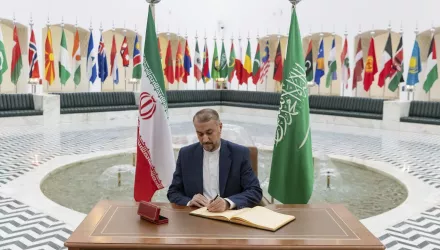Takeaways from the Harvard Kennedy School IDEASpHERE panel "Winning the Peace," with Graham Allison, Ashton B. Carter, Gary Samore, Elizabeth Sherwood-Randall, Amos Yadlin, and Robert Zoellick
Sampling of Notable Thoughts
“...[Y]ou may not appreciate how single-minded the institution of the Department of Defense was about the [Iraq war]....It was a tremendous preoccupation...[W]e need now to pull our head out of that foxhole and look...at the problems and challenges that are going to determine our future.” - Ashton B. Carter
“We had a cyber Pearl Harbor: His name was Edward Snowden.” - Ashton B. Carter
“...[S]topping Iran from getting nuclear weapons is one of the most important security challenges we face...I'm convinced that Iran would have nuclear weapons today if it wasn't for the efforts of the U.S. and its allies since Reagan...” - Gary Samore
“My main concern is miscalculation, unintended escalation,and mistakes....There was a hotline between Washington and the Kremlin. There is no communication between Jerusalem and Tehran.” - Amos Yadlin
WATCH: Recording of Full Session
Summary
The last seven decades without war among the great powers – what historians describe as “the long peace” – is a remarkable achievement. “This is a rare and unusual fact if you look at the last few thousand years of history,” said Graham Allison, director of the Belfer Center and moderator of the IDEASpHERE panel “Winning the Peace.” “Furthermore, it is no accident. Wise choices by statesmen have contributed to ‘the long peace,’ which has allowed many generations to live their lives.”
“Winning the Peace” featured a 'who’s who' of American and Israeli security professionals. They addressed the various policies that have contributed to great-power peace and predicted what kinds of security challenges would define the 21st century.
Former Deputy Defense Secretary Ashton B. Carter argued that peace and prosperity in the Asia-Pacific is the result of American military power.
Belfer Center Executive Director for Research Gary Samore said that preventing Iran from obtaining a nuclear weapon is “one of the most important security challenges we face” and elucidated policy prescriptions to achieve that end.
Elizabeth Sherwood-Randall, the White House Coordinator for Defense Policy, Countering Weapons of Mass Destruction, and Arms Control, lauded the Kennedy School for contributing actionable scholarship that has made the world safer.
Former Israeli military intelligence chief Amos Yadlin’s primary concern for the future is miscalculation: “There was a hotline between Washington and the Kremlin. There is no communication between Jerusalem and Tehran.”
Former World Bank President Robert Zoellick came full circle by returning to the Asia-Pacific: US policy vis-à-vis China will be “tough” because it is a balancing act between hedging and integration.
"Winning the Peace." Event Report, Discussion, IDEASpHERE Celebration, Harvard Kennedy School, May 16, 2014.


